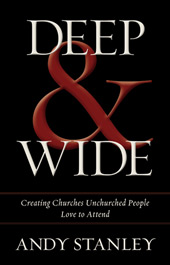Latest
-
Objections to the Christian Faith from the Unchurched and De-Churched
 Tue Dec 02, 2014
Tue Dec 02, 2014
by Resurgence -
Craig Groeschel: We Innovate for Jesus
 Tue Oct 14, 2014
Tue Oct 14, 2014
by Resurgence -
Mark Driscoll: Revelation
 Tue Oct 07, 2014
Tue Oct 07, 2014
by Resurgence -
RESURGENCE LEADERSHIP #034: JOHN PIPER, WHY I TRUST THE SCRIPTURES, PART 2
 Tue Sep 30, 2014
Tue Sep 30, 2014
by Resurgence -
Resurgence Leadership #033: John Piper, Why I Trust the Scriptures, Part 1
 Tue Sep 23, 2014
Tue Sep 23, 2014
by Resurgence

Archives
What are our determining factors?

In our everyday lives, there is a relationship between the events we experience and the way we interpret those events. A question that we may come to is: What determines how we interpret events and circumstances? Here are two things we landed on: our worldviews, and whom we are doing life with at the time.
What’s in a worldview?
Regarding worldview, if someone is convinced that “every good and perfect gift” comes from God, that everything belongs to God, and that we are simply managers, then when good things happen, those good things won’t be distractions to faith. If an individual believes God doesn’t keep bad things from happening to good people, but instead uses those moments to strengthen faith and draw attention to God, then painful pivotal circumstances will be viewed as opportunities. In the end, they strengthen faith.
God often showcases his power on the stage of human weakness.
Even a casual reading of the older New Testament would lead one to the conclusion that God often showcases his power on the stage of human weakness. But even that statement involves an interpretation of events, an interpretation based on a worldview shaped by the Scriptures. Helping people view the world through the lens of Scripture is critical to providing them with the proper context from which to interpret life.
It takes a community
The second factor that influences how we interpret the pivotal circumstances of life is who has access to us at the time: friends, family, mentors, and teachers. The writer of Ecclesiastes says we should have pity on those who fall and have no one to help them get back on their feet. We’ve all seen what happens when life takes somebody down and there’s no one around to help him properly contextualize his circumstances. When our faith is down for the count, we need people who will speak truth to us, friends who will remind us of God’s past faithfulness. We need people who will draw our attention outside of the realm of our immediate circumstances, people to put our circumstances in their proper context.
Perhaps the best New Testament example of this dynamic revolves around John the Baptizer’s arrest and incarceration. John, commissioned by God to announce the arrival of the Messiah, suddenly finds himself in jail with no prospect of release. And unlike other New Testament heroes who found themselves in similar straits, there’s no midnight miracle. No angelic visits. No earthquakes. He didn’t even receive a care package from his famous cousin—just the stench of Herod’s dungeon.
Jesus drew John’s attention away from his immediate circumstances.
Consequently, his faith took a big hit. He began to doubt. So he sent a message to Jesus through friends. More a question than a message, he asked, “Are you the one who is come, or shall we look for another?” In other words: This isn’t making any sense. Interpret, please! Jesus responded by drawing John’s attention away from his immediate circumstances to God’s broader activity in the world. He said, “Go and tell John what you hear and see: the blind receive their sight and the lame walk, lepers are cleansed and the deaf hear, and the dead are raised up, and the poor have good news preached to them.” In other words: Tell John what’s going on outside of his misery. Tell him not to let his faith get swallowed up in his immediate surroundings. Point him to the broader context. Doing so will help him rightly interpret what’s happening to him.
After Jesus sent John’s friends away, he made a remarkable statement to those standing around him, “Blessed is the one who is not offended by me.” The implications of that statement are staggering. Jesus acknowledges that his activity or lack of activity has the potential to undermine our faith. His lack of activity almost undermined John’s. And you know how that story ended. Not well. Jesus never came to his rescue. Apparently, he never bothered to visit. Herod eventually executed John. But apparently John died with his faith intact.
A model for behavior
Armed with these observations, we realized how important it was for us to be intentional about helping people develop a biblical worldview. So we determined to provide adults, teenagers, and children with a theological context that would enable them to maintain faith regardless of what came their way.
These observations undergirded our commitment to create a ministry model that was highly relational in nature. While it is always dangerous to be disconnected from other believers, it is especially dangerous when things aren’t going well. Here are several things we built into our model that both create opportunities to reiterate a Christian worldview and formalize healthy relational connections:
Baptism
Baptism videos continually illustrate how God uses pivotal circumstances to bring people to faith. In addition, they illustrate how people have maintained faith its the midst of difficulty. Sometimes, extreme difficulty.
2-to-1 mentoring
Our 2-to-1 premarital mentoring program provides engaged couples with seasoned married couples, who bring needed perspective to the unique challenges associated with being newly married.
Small group structure
Our closed small groups model provides relational support, as well as proper contextualization for singles and couples who are facing challenges.
Family ministry group structure
Keeping children and students with the same small group leader for several years creates a healthy relational dynamic. Children and students are particularly susceptible to misinterpreting negative events. Having a mature adult in their lives in addition to their parents can make all the difference when grappling with challenging circumstances.
When we are able to find God in the midst of life’s pivotal circumstances, our faith is strengthened. Whens we help people recognize God in the midst of their life circumstances, their faith is strengthened. Pivotal circumstances test, and therefore potentially strengthen, our confidence in God. For that to happen, people need context, a biblical worldview. And often, they will need someone to help them interpret what’s happening.
 This content is adapted from Andy Stanley’s new book, Deep & Wide. Pick up your copy today.
This content is adapted from Andy Stanley’s new book, Deep & Wide. Pick up your copy today.